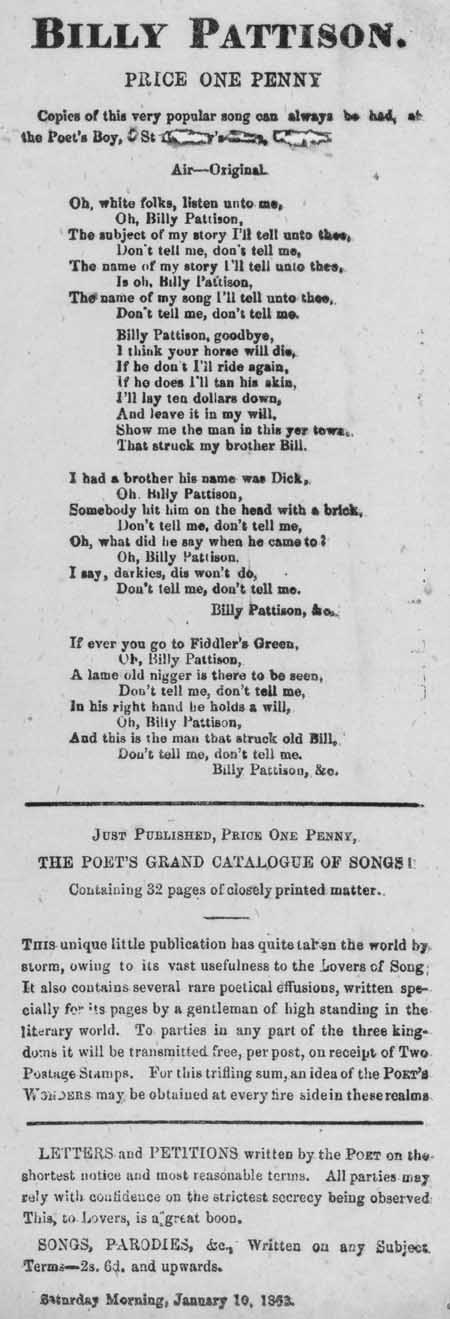Commentary
Verse 1: 'Oh, white folks, listen unto me, / Oh, Billy Pattison, / The subject of my story I'll tell unto thee, / Don't tell me, don't tell me / The name of my story I'll tell unto thee, / Is oh, Billy Pattison, / The name of my song I'll tell unto thee, / Don't tell me, don't tell me.' This song was to be sung to an 'Original' tune, and was priced at one penny. It was published on Saturday, 10th January 1863, by the Poet's Box, probably in Glasgow. This song has its roots in the slave trade between Africa and North America. Some of the songs sung by the African-American slaves were recorded and standardised by white collectors in much the same way Scottish ballads had been collected. Ironically, within a few years these songs were being performed as 'negro spirituals' by white entertainers to white audiences worldwide. 'Billy Pattison' may be an adaptation of such a song. Although containing the call-and-response structure that characterised many 'spirituals', it is about the murder of a white man by an African-American, and contains anti-black sentiments.
The Poet?s Box in Glasgow operated from 1849 to 1911. Matthew Leitch was the proprietor at 6 St. Andrew Lane?s, a narrow street on the south side of Gallowgate, from 1850 to 1858. His son William Munsie Leitch worked at the same address from 1859 to 1865 and at varous addresses in London Street until 1911. Many of the broadsides published by the Glasgow Poet?s Box were dated and some carried advertisements, not just for printed items but also for shoe blacking and ?soap for lovers?! Like the other ?boxes? in Dundee and Edinburgh, the Glasgow one sold love songs, sea shanties, parodies and dialogues. It is not clear what the connection between the different Poet?s Boxes were. They almost certainly sold each other?s sheets. It is known that John Sanderson in Edinburgh often wrote to the Leitches in Glasgow for songs and that later his brother Charles obtained copies of songs from the Dundee Poet?s Box. There was also a Poet?s Box in Belfast from 1846 to 1856 at the address of the printer James Moore, and one in Paisley in the early 1850s owned by William Anderson.
Early ballads were dramatic or humorous narrative songs derived from folk culture that predated printing. Originally perpetuated by word of mouth, many ballads survive because they were recorded on broadsides. Musical notation was rarely printed, as tunes were usually established favourites. The term 'ballad' eventually applied more broadly to any kind of topical or popular verse.
View Transcription | Download PDF Facsimile
|
 |
Date of publication:
1863 shelfmark: L.C.1269(160a)
 View larger image
View larger image
|


